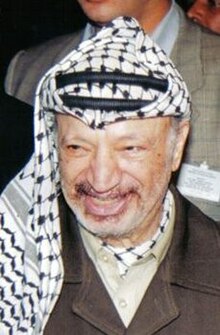Raʾīs(Arabic:رئيس), pluralruʾasāʾ,is anArabictitlemeaning 'chief' or 'leader'. It comes from the word for head,raʾs.The corresponding word for leadership or chieftaincy isriʾāsa.[1]It is often translated as 'president' inArabic,and as 'boss' inPersian.Swahilispeakers may also use it for president. TheOttoman Turkishform of the title isreis,which denoted acaptain(a term with identical etymology, being fromLatincaput,'head').The termraʾīsis of pre-Islamic origin. It may function as an honorificlaqabin a person's name. In the centralArab world,the term originally meantvillage headman.[1]

British India
editIn British India thelanded nobilityin Muslim societies often used the wordraisto describe their aristocratic position held in society. The termraiswas also often used by Muslims when making deed of endowments in their community. Although the word meant 'chief' or 'leader', legal documents used it in the context of 'landlords' or landowners. Other terms such asmalikorzamindaralso appeared as 'landlords', ‘landowners, or 'taxers', even though these titles implied that the individual who bore them was more ruler than proprietor.[2]
However, when describing any aspect of the management of their holdings, 'raisorzamindars' employed regal terminology. Theraissat upon a throne (masand or gaddi).Riayat,whom British preferred to call tenants or cultivators were literally subjects. When araismet with hisriayathe described himself as holding court (darbar). The money whichriayatpaid his lord was tribute (nazrana) not rent. The place where he paid the tribute was called akachari,just as a government revenue office was, and the clerks who collected, kept accounts and ensured tributes kept coming on time were known by their Mughal courtly styles of (dewans) and (sipahis– a horse trooper).[2]
Urdu
editFrom Arabic, via Persian, this word came intoUrduasraees,which means a person belonging to thearistocracyof noble distinction.[3]
InUrdu,the wordRaisis also used similarly to the English term "old money,"as the opposite or antonym ofnouveau riche,a person who has accumulated considerable wealth within his or her generation.
When the book "The Pleasure of Philosophy" byWill Durantwas translated into Urdu, by SyedAbid Ali Abid,he translated the word aristocracy with the Urdu wordraisiyyat(رئیسيت).
Palestine
editThe Arabic adjectiveazam[عظيم](meaning 'great'), is also added to mean 'the greatra’is'. This term, as well as the Hebrew termיושב-ראש (chairman), are used byIsraelimedia to refer to thePresident of the Palestinian National Authority,as opposed toנשיא (president).
In a New York Times op-ed, commentator Bret Stephens referred to late Palestinian leader Yasir Arafat as "the rais."[4]
In December 2022, regional lawmakers voted to change the title of thehead of the republicfrom president to rais. The title of president was seen as the last remaining symbol of federalism following the centralization reforms underVladimir Putin.[5]
References
edit- ^abA. Havemann;C. E. Bosworth& S. Soucek (1995)."Raʾīs".InBosworth, C. E.;van Donzel, E.;Heinrichs, W. P.&Lecomte, G.(eds.).The Encyclopaedia of Islam, Second Edition.Volume VIII:Ned–Sam.Leiden: E. J. Brill. pp. 402–403.ISBN978-90-04-09834-3.
- ^abMuslim Endowments and Society in British India, By: Gregory C. Kozlowski. pp 47-48. Cambridge University Press, 1985.ISBN0521088674
- ^Hobson-Jobson: The Definitive Glossary of British India, By: Henry Yule, A. C. Burnell - pg 438. Oxford University Press, 2013.ISBN978-0-19-960113-4
- ^Stephens, Bret (November 18, 2017). "Mugabe and Other Leftist Heroes".New York Times:A19.
- ^"Russia's Tatarstan to Rename Regional Presidency".The Moscow Times.23 December 2022.